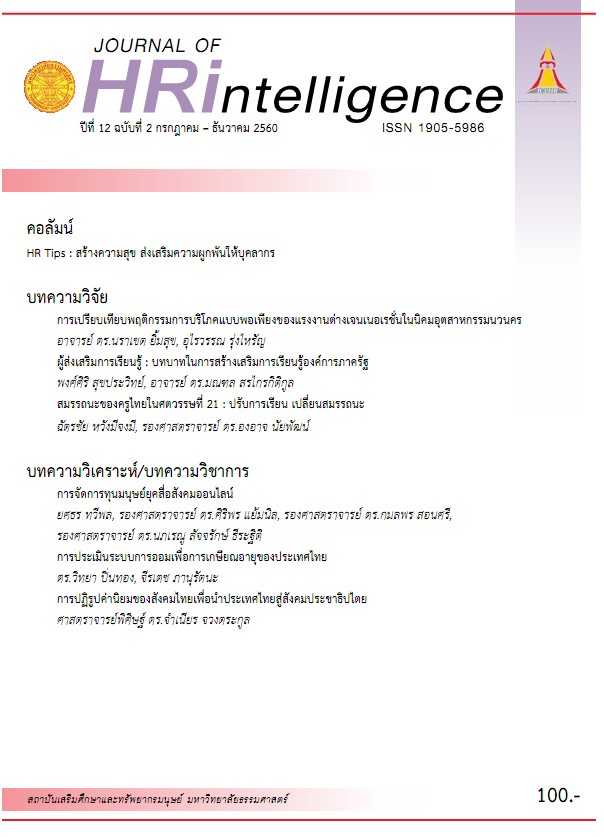Human Capital Management in the Era of Social Media
Main Article Content
Abstract
The objective of this paper was to investigate these following questions: (1) What dimensions of human capital management in public sector and private sector are the objectives of social media use?; (2) What are the limitations of social media applied to human capital management?; and (3) What are important ethical issues of social media applied to human capital management? The results found that: (1) The social media were used for the human capital management in terms of recruitment, especially talent acquisition, Generation Y employees, employee branding, collaboration and communication, employee selection via social media, and social media use in workplace; (2) There were several limitations of social media applied to human capital management such as inconsistency of employee value and business value, inconsistency of social media and conventional system of the company, no privacy, and insecurity of data; and (3) Regarding the ethical issues of social media applied to human capital management, an analysis of diversity, fairness, and access was conducted. The findings revealed that there were ethical issues related to the social media as mentioned above. Additionally, the social media were widely used for the human capital management in the world’s leading private companies while there were many limitations of social media use in the public sectors.
Article Details
ขอมอบลิขสิทธิ์บทความที่ได้รับการตีพิมพ์ให้แก่สถาบันเสริมศึกษาและทรัพยากรมนุษย์ กรณีมีการฟ้องร้องเรื่องการละเมิดลิขสิทธิ์เกี่ยวกับภาพ กราฟ ข้อความส่วนใดส่วนหนึ่ง และ/หรือข้อคิดเห็นที่ปรากฎในบทความ ให้เป็นความรับผิดชอบของข้าพเจ้าและผู้เขียนร่วมแต่เพียงผู้เดียว
References
Langlois : http://langlois.ca/human-resources-management-in-the-era-of-social-media/.
Bennett, S., Maton, K., & Kervin, L. (2008). The 'digital natives' Debate : A Critical Review of the Evidence. British
Journal of Educational Technology. 39 (5), 775-786.
Bondarouk, T., Ruel, H., Axinia., E. & Arama, R. (2013). What Is the Future of Employer Branding Through Social
Media? Results of the Delphi Study into the Perceptions of HR Professionals and Academics. In Bondarouk,
T. & Olivas-Junjan, M.R. (Eds.), Social Media in Human Resources Management. (pp.23 - 57). Bradford :
Emerald Group Publishing.
Coyle-Shapiro, J., Hoque, K., Kessler, I., Pepper, A., Richardson, R., & Walker, L. (2013). Human resource management.
London : University of London.
Doherty, R. (2010). Getting Social with Recruitment. Strategic HR Review. 9 (6), 11-15.
Guerin, L. (2017). Smart Policies for Workplace Technologies : Email, Social Media, Cell Phones & More. Berkeley :
NOLO Publisher.
Hunt, K.G. (2010). Finders Keepers : Social Media Strategies Help Find Top Talent. Journal of Property Management.
75 (6), 36-40.
Hysa, B., Zdonek, I. & Mularczyk, A. (2015). Social Media-The Challenges and The Future Direction of The Recruitment
Process in HRM Area. Studia Ekonomiczne, 54-67.
Isaacson, K. & Peacey, S. (2012). Human Resources and Social Media. In Kahn, W. A. (Ed.), Psychological Conditions
of Personal Engagement and Disengagement at Work. Academy of management journal. 33 (4), 692-724.
Lusk, R. E. (2014). Facebook’s newest friend--Employers : Use of Social Networking in HiringChallenges US Privacy
Constructs. Capital University Law Review. 42 (3), 709-762.
Nassiriyar, M., Sadeghzadeh, A., Haghshenas, M., & Shahbazi, R., (2015). Social Networks Application for Human
Resources. AASCIT Journal of Education. 1 (3), 45-51.
Papakonstantinidis, S. (2014). Social Recruiting : Exploring the Impact of Online Social Networking Sites (SNS) on Digital
Natives' Occupational Opportunities (Doctoral dissertation). University of Leicester, the School of Management.
Pareek, A., Jindal, P.R., Nair, S., & Muthyala, S.K. (2012). Social Media : Impact and Relevance in Managing Human
Resources in India. Retrieved January 30, 2017, From wipro : http://www.wipro.com/Documents/Social_
Media_Report_Feb_2012.pdf.
Pew Research Center’s. 2014. Social Media Update (2014). Retrieved January 30, 2017, From Pewinternet : http://
www.pewinternet.org/2015/01/09/social-media-update-2014/.
Reisenwitz, T. H., Iyer, R. (2009). Differences in Generation X and Generation Y : Implications for the Organization
and Marketers. Marketing Management Journal. 19 (2), 91-103.
Sharma, N. (2014). Recruitment Strategies : A power of E-Recruiting and Social Media. International Journal of Core
Engineering & Management (IJCEM). 1 (5), 15-35.
Tufts, S. H., Jacobson, W.S., & Stevens, M.S. (2015). Status Update : Social Media and Local Government Human
Resource Practices. Review of Public Personnel Administration. 32 (2), 193-207.
Vorhauser-Smith, S. (2013). Three Companies Nailing Social and Mobile for H.R. Retrieved January 30, 2017, From
Forbes : https://www.forbes.com/sites/sylviavorhausersmith/2013/0/09/three-companies-nailing-socialmobile-for-hr/#418f5fb02892.
Weaver, A. C., & Morrison, B. B. (2008). Social Networking. Computer. 41 (2), 97-100.
Zafar, M. & Rastogi, N. n.d. Social Media and HR Practices. Retrieved January 30, 2017, From https://www.
academia.edu/6902619/Social_Media_and_HR_Practices.
Zhang, L. (2014). Legal and Ethical Implications of Using Social Media in Human Resource Management. International
Journal of Innovation - IJI. 2 (1), 65-76.


